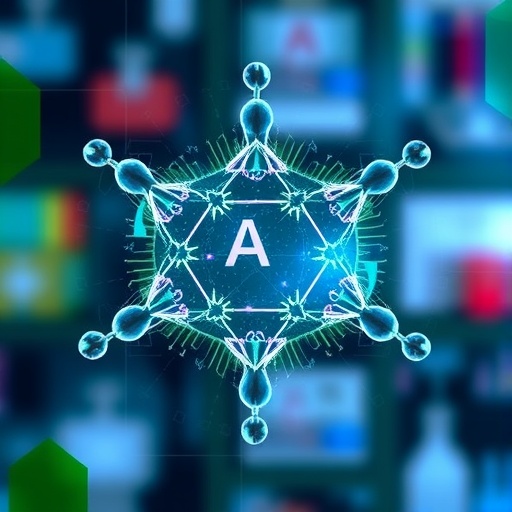In an era where the intersection of technology and sustainability is increasingly paramount, researchers are making significant strides in revolutionizing conventional chemical processes. At the forefront of this innovation is Dr. Tobias Schnitzer and his research team at the University of Freiburg, who are employing Artificial Intelligence (AI) to transform amidation reactions, a critical yet environmentally taxing process in the chemical industry. Amidation reactions are fundamental across various sectors, ranging from pharmaceuticals to agrochemicals, yet they underpin significant ecological challenges due to their toxic waste output and energy-intensive requirements.
The ecological footprint of amidation reactions stems largely from the reagents and solvents traditionally utilized in their synthesis. Conventional methods often deploy toxic chlorination agents that not only pose operational hazards but also lead to the generation of harmful by-products. As global awareness of environmental issues mounts, Schnitzer’s team is tackling these drawbacks head-on with research designed to mitigate the adverse effects of chemical manufacturing on the environment.
Dr. Schnitzer’s group is pioneering the development of innovative amidation reactions that utilize boronic acids as catalysts. This shift not only eschews the need for hazardous reagents but also embraces sustainable, bio-based solvents that promise significantly reduced energy consumption during the production process. These advancements are crucial for achieving a greener chemical industry that aligns with global sustainability goals, which emphasize resource efficiency and reduced waste.
A critical component of this research involves leveraging AI to predict the catalytic properties of a vast library of boronic acid catalysts, which serves as a foundation for the project. By applying advanced computational models, the team aims to evaluate the reactivity of diverse catalysts without the necessity of deploying extensive experimental resources. This methodology not only enhances efficiency but also underscores the potential for AI to streamline research processes across chemical disciplines. Traditional approaches often require significant laboratory testing, consuming valuable time and resources; Schnitzer’s strategy minimizes this dependence, accelerating the path from discovery to application.
Moreover, the Freiburg project is not merely an academic exercise; it is backed by substantial financial support from the Vector Foundation. With a generous funding commitment of £1.5 million over six years, the project is poised to transition from theoretical models to practical applications in the chemical sector. Schnitzer emphasizes the importance of developing a practical amidation process that produces only water as a by-product, further elevating the potential for adoption of these methodologies in commercial manufacturing environments.
In addition to addressing ecological concerns, the research has far-reaching implications for economic viability. Midazolam amidation processes are central to producing essential compounds used across multiple industries. The transition to more sustainable methods of production holds the promise of reduced operational costs while simultaneously fulfilling the industry’s growing demand for environmentally responsible practices. According to Schnitzer, the outcomes of their work could not only alter perceptions of the chemical sector as a whole but also highlight the innovative potential inherent in applying AI to green chemistry.
Also critical to the success of this initiative is the collaborative nature of the research, which spans multiple disciplines within the scientific community. By invoking the combined expertise of organic chemistry, computational science, and sustainability practices, Schnitzer’s team embodies a multi-faceted approach to address the challenges presented by conventional amidation methods. This collaboration underscores a broader trend within the scientific community: recognizing that innovative solutions often emerge when diverse perspectives converge.
The relevance of this work extends beyond its immediate applications. As the world grapples with the pressing issues of climate change and ecological degradation, the transition to greener chemical processes represents a crucial step toward addressing these global challenges. The advances made by Schnitzer and his team can serve as a model for future research endeavors, inspiring similar initiatives focused on sustainability within various fields of chemistry.
Furthermore, the endeavors at the University of Freiburg epitomize a shift in the broader narrative surrounding chemistry. Historically, the field has struggled with an image overshadowed by concerns of pollution and waste. However, initiatives such as Schnitzer’s promise to redefine this perception as one where chemistry and environmental stewardship are no longer mutually exclusive, but rather interdependent facets of progress and innovation.
As the research progresses, its impact on educational frameworks cannot be understated. By highlighting the relevance of green chemistry and its integration with burgeoning technologies like AI, the initiative can spark interest among young scientists. This potential for influencing the future generations of chemists is vital for cultivating a more environmentally conscious approach to science and industry.
Ultimately, the ongoing research undertaken by Dr. Tobias Schnitzer and his team is a compelling illustration of how academia can directly contribute to solving some of the most pressing issues of our time. Through their commitment to the development of greener amidation methods, they are laying the groundwork for a sustainable chemical industry—one that reconciles production needs with ecological vigilance. As they continue to unlock the potential of AI in catalysis, the project promises not only to advance scientific understanding but also to serve as an influential touchstone for future innovations in sustainable chemistry.
The implications of their work could resonate deeply within the domains of industrial and academic chemistry, providing a template from which future research can be inspired. Encouraging sustainability, resource efficiency, and innovation, the outcome of Schnitzer’s research may well define the landscape of chemical manufacturing for years to come.
Subject of Research: Innovative amidation reactions using AI and boronic acid catalysis
Article Title: Revolutionizing Amidation: The Future of Green Chemistry
News Publication Date: [To be filled upon publication]
Web References: [To be filled upon publication]
References: [To be filled upon publication]
Image Credits: Klaus Polkowski / University of Freiburg
Keywords
Chemistry, AI in Chemistry, Green Chemistry, Sustainable Practices, Catalysis, Chemical Processes, Environmental Impact, Resource Efficiency




